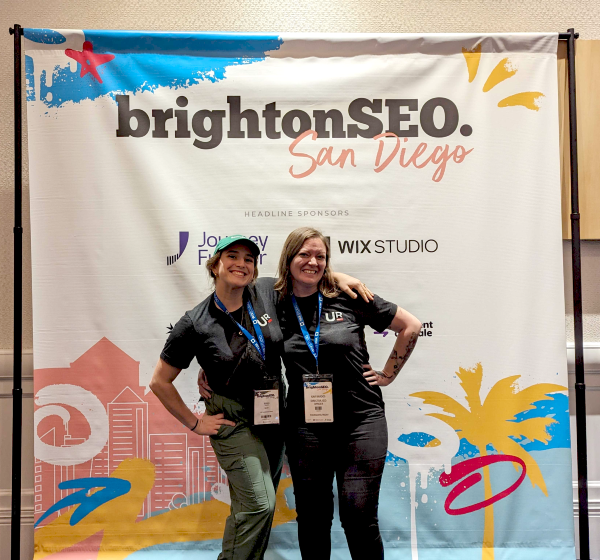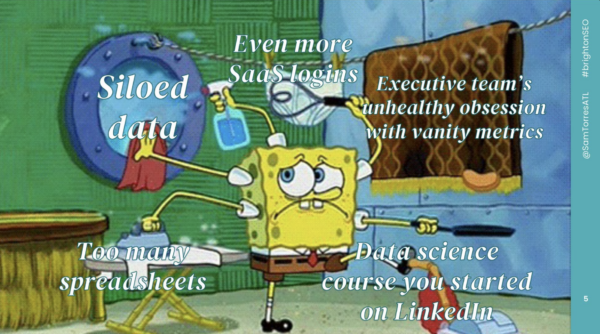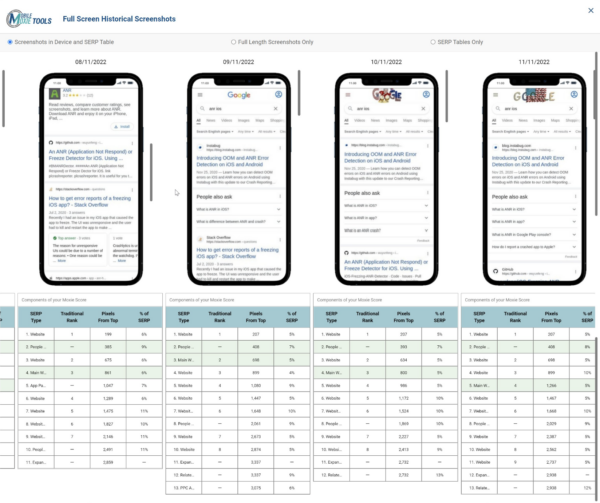Table of Contents
It's been a week since brightonSEO mounted its first US-based conference, the San Diego edition of what is probably the industry's most famous and beloved annual get-together. I was lucky enough to attend along with fellow Uproerian Jess Girardi, and now that our extroversion (and actual) hangovers have fully subsided, we're here to share some insights from our favorite talks.

Britney Muller - AI: The Double-Edged Sword
Britney serves in a unique role in the SEO community: that of a liaison between the world of AI and machine learning and those of us who are still struggling to write comprehensive prompts in ChatGPT. She claims she's "on a mission to make this tech accessible," and her enthusiasm for and ability to elucidate complex systems like LLMs is evident any time she takes the stage. This talk was no different, but we also got a glimpse at the ways AI is set up for failure in terms of inclusivity.
For example: Wikipedia is one of the strongest providers of training data for popular LLMs. But 87% of current Wikipedia contributors are self-reportedly male. They're also overwhelmingly white, and most hold post-secondary education credentials. The inherent bias that these demographics lend to generative AI is probably most obvious in image creators like Midjourney, which is apparently incapable of spitting out an image based on the prompt "smartest guy in the world" that doesn't feature a white man with glasses:

More problematically, we end up with images like these, where the PGA artificially expanded upon golfers' headshots with expectedly ridiculous results:

The headshots of golfers Tony Finau and Collin Morikawa feature "broken" backgrounds, which Britney suggested is due to insufficient representations of people of color within the generator's training data. She pointed out that as AI continues to proliferate the internet, it will undoubtedly shape younger generations' worldviews. The cure for inherently biased AI is putting ethical concerns at the forefront of these tools' roadmaps and correcting for the lack of diversity in the rooms where product decisions are made.
Britney graciously recorded a version of her talk for those who couldn't make it to her brightonSEO time slot. You can watch the whole thing here.
Will Critchlow - SEO in Turbulent Times / Andrew Holland - The New SEO Metric that Makes SEO 10x More Valuable
Will and Andy delivered a double dose of advice for agencies, freelancers, and anyone out here in these streets struggling to convince their stakeholders that SEO is worth the investment.
I found Will's talk to be quite reassuring during this period of economic uncertainty. The crunch, he said, is being felt by all of us right now, so you're not alone if it feels like it's harder than ever to justify your existence as a search marketer. He shares the opinion of Marshall Simmonds, whom he quoted as saying that "turbulence within Google is job security for SEOs" because clients and managers look to us to make sense of what appears to them to be ever-changing rules delivered from within the search engine's mysterious black box.
If agencies want to capitalize on that demand, Will said, we have to tie SEO initiatives to actual business goals—and dollars—rather than pitching tactics that won't move the needle. And we shouldn't just ask our points of contact for their translations of those goals; we should ask for actual in-house materials, created by brand leadership, where the people who sign the checks describe first-hand what pillars they're focused on in the upcoming year.
In addition to constantly being pitched random acts of marketing, decision-makers are wary of us because of the terrible sell that SEO has become. Brands want quick sales, profit, and growth, Andy explained, but we tell them "it's slow going, it's not guaranteed, a lot of it is out of our control."
To earn business that's increasingly concerned with tangible results, he recommends a metric known as share of search, which includes the volume of search queries for a given brand in proportion to the sum of queries for all brands within the competitive landscape. By showing executives how branded searches, and therefore brand awareness, are increasing, we can tie high purchase intent more directly to higher profits and better demonstrate ROI. Andy's approach to growing share of search focuses on digital PR, which he said is the most direct way of ensuring a brand is top of mind and positioned for purchase-ready search.
Both Will and Andy have shared their talk slides publicly—find them here and here.
Panel Discussion on Tech SEO with Will Critchlow, Sam Torres, Danielle Rohe, Max Prin, and Richard Chavez
Tech SEO has always been a favorite of some Uproerians like Jess, and this panel dove deep into the nitty gritty of tech SEO. Will Critchlow moderated with Sam, Danielle, Max, and Richard throwing out takes and answering deep questions.
Sam's take on not knowing how to code to be a great tech SEO was one that resonated with us. The panel then quickly pointed out that it is essential to know how to speak to code, but this doesn't mean you have to be able to write it, encouraging use of tools like ChatGPT and other AI to aid in your conversations.
The panel covered a variety of topics, but their love of headless CMS's stood out. We've worked with headless before, and we can say that they are so much more flexible for content writers and technicians alike. We're excited to see where it goes!
Sam Torres - Building Data that Grows with You / Dana DiTomaso - Will It Blend? Methods to Level Up Your Reporting Using Looker Studio
Both Sam and Dana are absolute reporting geniuses. You'd be wise to follow both of them for consistent advice on covering what matters in your reports, making them look great, and troubleshooting the ones that won't act right.
In particular, Sam's recommendation to get away from the "one dashboard to rule them all" mindset is one we should all be following. Reporting dashboards should be themed around what questions the data can answer and the audience who cares, she said—a CEO needs and wants different information from a marketing VP, so we shouldn't expect the same dashboard to serve them both. And if you're one of the many SEOs wondering how the heck you're supposed to blend UA and GA4 data meaningfully in Looker Studio, this how-to from Dana is all you need—take it from someone who's turned to her instructions several times already.
Special shout-out to Dana for the incredibly valuable lunch she shared with me and Jess and for using what is now my favorite conference deck title of all time. And another shout-out to Sam for this incredibly triggering slide that dragged me, personally, straight to hell:

The slides from these talks themselves are more useful than any insights I could convey in words, so I recommend perusing Sam's here and Dana's here before you start compiling your next report.
Cindy Krum - Fighting SEO Imposter Syndrome with Facts
Finally, I want to highlight Cindy's talk as the one that surprised me the most and the one that's most likely to change the way I do SEO. I attended the session expecting to hear an emotionally focused talk on data-driven approaches to boosting your confidence at work, but instead I got actionable recommendations for explaining changes in rankings, impressions, and clicks using data we often forget about. (I'd still love to see a talk on the former. Someone with a psych background should pitch this!)
Imposter syndrome is incredibly prevalent in our industry. There are a few reasons for this—the one that hits me the hardest is the fact that there are too many niches to pursue, which can make me feel like I'm not a "real" or "good" SEO because I'm not a master of every last one of them. Cindy pointed out that another common culprit is how frequently we're unable to point to concrete explanations for changes in rankings or traffic. This, she said, is largely a failing of the tools we depend on.
When it comes to SERP layouts, it seems the only thing that stays the same is change. Especially on mobile SERPs, Google tweaks ad displays, shrinks or enlarges images, and tests new features that can cause your organic result to suddenly appear thousands of pixels farther from the top of the page than it was the day before. Instead of burying our heads in tools that don't illuminate the physical changes that cause CTR and basic visibility to shift, Cindy said, we need to spend more time proactively examining the SERPs in order to explain frustrating fluctuations. Her company, MobileMoxie, has a tool that does a better job than most of tracking movement in terms of pixels:

Cindy argued that concerns like lack of clarity about what's happening in the SERPs, and others that contribute to imposter syndrome, should inform product decisions inside the tools we use. Better in-tool data, insights, and explanations would help combat SEOs' insecurities and enable us to approach our stakeholders with greater confidence.
Watch a version of Cindy's talk on YouTube.
We can't wait for next year!
Jess and I both live-tweeted several of the talks we attended. You can find our in-the-moment takes compiled here. We had a great time representing Uproer in San Diego, and we're so excited that the warmth, friendliness, and incredible value of brightonSEO have finally been duplicated stateside. We're looking forward to returning next November—maybe you'll even see some Uproerians onstage!
Thanks again to the brightonSEO crew for putting on such a fantastic experience.

